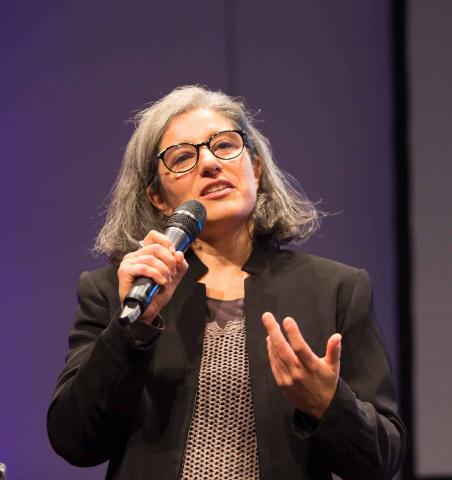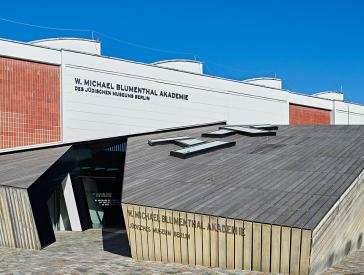Didactics of the Middle East Conflict
Our Fellow Rosa Fava and Her Research
From January 2017 to May 2018, the education scholar Dr. Rosa Fava has been resident at the Jewish Museum Berlin as our second W. Michael Blumenthal Fellow. She was receiving support for her post-doctoral research project “Didactics of the Middle East Conflict.” The research surveys and analyzes projects that are developing resources for schools and youth groups to explore the Middle East Conflict or offering training for teachers and other professionals. In part, the research is investigating the educational scope: Is the Israel-Palestine conflict the main focus? Or are other elements included?
The Shifting Meaning of “Middle East Conflict”
The significance of the Middle East conflict has been growing in German schools, politics, and the public sphere – especially since Chancellor Angela Merkel, addressing the Knesset in 2008, declared Israel’s security a non-negotiable commitment for the German state.
Learning about the Middle East conflict has been changing in recent years. It has gained a special status, and is no longer merely a case study for the more general topic of “international conflicts” as laid down in many school syllabuses. At the same time, there are complaints that the Middle East Conflict is neglected in schools, resulting in a failure to counter growing antisemitism, whether aimed against Israel, against Jewish institutions, or against individuals here in Germany. Hence, teaching and learning about the Middle East Conflict is highly charged and emotionally loaded in many ways – and is often directly political.
Focus on Training for Teachers and Others
The research also focuses on training for teachers and other individuals charged with helping young people form opinions. It seems that many teachers consider the Middle East conflict very important, but do not feel confident enough to teach classes on the subject, especially if their pupils come from Arab and/or Muslim families. They are asking for training, and also for external partners to carry out workshops. Often they want these experts to have a close personal connection with the Middle East conflict, for example through an affiliation with Islam or Judaism, or through family ties to an Arab state, the Palestinian territories, or Israel.
Questions about New Teaching Concepts and Materials
Particularly since the Second Intifada of 2000 and the 2001 attacks in the United States, many new projects and initiatives have engaged with the theme of Islamist and Israel-related antisemitism, and its role in the Middle East conflict, by designing new materials and seminars.
Rosa Fava’s research seeks to discover how the new projects deal with the emotional weight of the Middle East Conflict in their methods and materials, and which particular skills they aim to impart to teachers and other educators. Who are the players in the new educational institutions, and what are their personal concerns? How do these projects implement key principles of teaching history and civics – controversy, multiplicity of perspectives , and pluralism – while avoiding conflict in classrooms and youth centers? How do they bring together factual knowledge and emotions? How do they account for differing personal involvement in the conflict and the different kinds of identification at play – especially for teachers and team members who are treated as neutral and not directly affected?
In short, what does it take to teach about the Middle East Conflict? Have any general guidelines emerged that could also be applied to education on other international conflicts in which young people and adults have differing personal involvement? Last but not least, how does German national interest translate into education?
The research is empirically grounded in analyses of learning materials, observations of continuing education courses, and interviews. Based on her findings, Dr. Fava will develop and publish a set of practical recommendations.
Dr. Rosa Fava

Rosa Fava at the award ceremony for the 2016 Lars Day Prize; Jewish Museum Berlin; photo: Ernst Fesseler (more about the Lars Day Prize in the current call for nominations on our website (in German))
 X
X
Rosa Fava at the award ceremony for the 2016 Lars Day Prize; Jewish Museum Berlin; photo: Ernst Fesseler (more about the Lars Day Prize in the current call for nominations on our website (in German))
Rosa Fava studied chemistry and history for secondary education and worked in historical and political education for many years at the Neuengamme Concentration Camp Memorial in Hamburg, Arbeit und Leben Hamburg, and elsewhere. In 2004, she co-founded the Kreuzberg Initiative against Antisemitism in Berlin. In 2013, in Hamburg, she defended her dissertation on redefining “Education after Auschwitz” in a multiethnic society, a discursive analysis through a critical, anti-racist lens (published in 2015, German table of contents available on the Metropol Verlag website). She also published a series of essays on subjects such as the commemoration of Black victims of Nazism and antisemitism in Germany’s multiethnic society.
Even before her fellowship, Rosa Fava was involved with the Jewish Museum Berlin. From May to December 2016, she ran our Academy programs while the director was on parental leave. From 2012 to 2015, she directed the Diversity in Schools project, which was run by the Jewish Museum Berlin in cooperation with the German Children and Youth Foundation (DKJS) and was funded by Stiftung Mercator.
In 2016, Rosa Fava submitted an expert report for the German Bundestag’s Independent Expert Committee on Educational and Exchange Projects by Muslim Players to Prevent Antisemitism (published online in summer 2017). In 2015, she conducted an unpublished survey of educators against antisemitism on behalf of the Kreuzberg Initiative against Antisemitism. Rosa Fava gives talks and runs workshops on her subject areas and is currently advising a project that is revisiting the Armenian Genocide in Germany.
From June 2018 you can reach Rosa Fava here:
Contact
Dr. Rosa Fava
rosa.fava@amadeu-antonio-stiftung.de
The W. Michael Blumenthal Fellowship is sponsored by the Berthold Leibinger Foundation.



